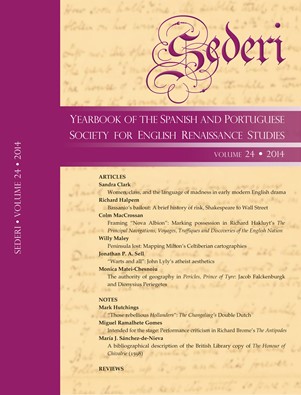Women, class, and the language of madness in early modern English drama
Keywords:
madness, language, nonsense, transgression, taboo, impertinency, popular tradition, ballads, gender, liberation, imagination, sexualityAbstract
This paper discusses the depiction of madwomen in a range of early modern English plays including some by Shakespeare in order to show how their madness operates at the intersection of gender, genre, and social class. Its particular focus is on language, and it argues that the speech styles of madwomen are essentially similar whatever their social class. For women, madness is a linguistically liberating condition, bringing together high and low cultural discourses. While stage madwomen’s language has similarities with that of madmen, it is more licentious and transgressive because the violation of social and behavioural norms is more extreme.
Downloads
Downloads
Published
Issue
Section
License
The copyright holder of the published contributions is SEDERI.The hardcopy and an open-access version of the journal will be published simultaneously. The issues will be available online in the SEDERI website (http://www.sederi.org/yearbook/) and other repositories that have signed an agreement with SEDERI.
The authors who publish with this journal agree to the following terms:
a) SEDERI retains copyright of the essay.
b) If the author wishes to republish or rewrite the essay for another journal, or include the essay published in SEDERI in their personal repositories, or in any other way, they should contact the editors to obtain permission to do so. This will entail citing SEDERI as the original source and sending the editors a copy of the new version, or the link to the website, in case of online publishing.
The author(s) hereby warrant(s) that:
a) The essay submitted for publication is an original creation and does not infringe any copyright or property right of another journal, author or publisher.
b) The essay submitted for publication has not been previously published, whole or in part, and is not being considered for publication elsewhere.
c) Written permission has been obtained for any material from other sources included in the essay submitted for publication.




